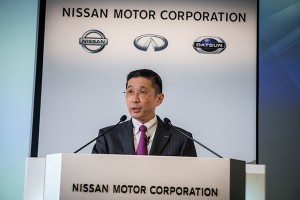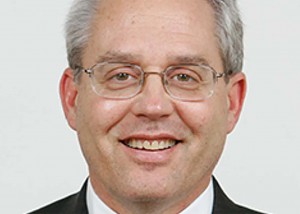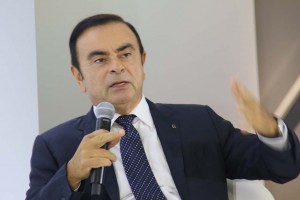Former Nissan Chairman Carlos Ghosn made his first public appearance since being unexpectedly arrested on financial corruption allegations Tuesday, telling a Tokyo court that he has been “wrongly accused.”
Ghosn has been held in solitary confinement in the Tokyo Detention Center since shortly after his corporate jet arrived at Haneda Airport on November 19th in a case that, while centered around claims of financial wrongdoing has also raised concerns about whether his arrest was influenced by Nissan’s desire to shake off the control of its alliance partner Renault. The French affiliate rescued the Japanese automaker from bankruptcy 20 years ago but has since dominated their partnership.
“I have been wrongly accused and unfairly detained based on meritless and unsubstantiated accusations,” the 64-year-old Ghosn said while wearing handcuffs tied to a rope around his waist. “I believe strongly that in all of my efforts on behalf of the company, I have acted honorably, legally and with the knowledge and approval of the appropriate executives inside the company.”
(Japanese court extends Ghosn’s jail time. Click Here for the story.)
Ghosn, who was dressed in a suit without tie and slippers, appeared significantly thinner than before his arrest, his son Anthony over the weekend telling a French newspaper that his father had lost about 10 kilograms, or 22 pounds, while in detention. The Brazilian-born executive has been held in a small cell with prosecutors repeatedly questioning him and demanding he sign a confession which was reportedly written in Japanese, which Ghosn does not speak.

Nissan President and CEO Hiroto Saikawa has been pushing for more independence from Renault in recent months.
The court hearing was his first time out of the detention center. Under Japanese law, a suspect normally can be detained for no more than 10 days but prosecutors have taken steps to repeatedly extend his custody, among other things, raising additional charges against Ghosn.
The case was set into motion, according to Nissan, when a whistleblower raised concerns about alleged financial corruption including efforts to hide about $44 million in income between 2011 and 2015. Ghosn has also been accused of using Nissan funds to purchase homes in both Brazil and Lebanon and shifting personal losses to the company.
Ghosn’s lead attorney is a former prosecutor, the well-respected Nobuo Gohara. He has maintained silence in recent weeks, only beginning to lay out the executive’s defense during Tuesday’s hearing and a subsequent news conference.
“In this high-profile case, news had been dominated by information from the prosecutors and Nissan, so the public tended to view him accordingly,” Gohara said. “But today it was all Ghosn. That’s very significant.”
When Nissan outlined its own case against its former chairman in November it said a months-long investigation had uncovered “substantial and convincing evidence of misconduct.”
During his Tuesday appearance, Ghosn addressed the various charges he faces, among other things telling the court, “I never received any compensation from Nissan that was not disclosed, nor did I ever enter into any binding contract with Nissan to be paid a fixed amount that was not disclosed.”

Greg Kelly, who was also arrested on financial corruption allegations, was released on bail last month.
As to the claim he transferred personal losses to the automaker, he said he asked Nissan to temporarily assume his foreign exchange contracts because he would have had to otherwise step down and use his retirement benefits as collateral. The automaker eventually transferred the contracts back to Ghosn, his lawyers said, without incurring any losses.
One of the allegations the executive faces involves a $14.7 million payment by Nissan to Saudi businessman Khaled Al-Juffali. Ghosn defended the payment which, he counted, provided “critical services that substantially benefited Nissan.”
The Khaled Juffali company issued its own statement on Tuesday, asserting that the payments it received “were for legitimate business purposes.”
Prosecutors have yet to file formal charges against Ghosn on all the allegations they have raised. Their strategy of laying out individual allegations, drop by drop, has allowed them to keep the executive in custody without bail, though Ghosn’s lawyers are now pressing for his release on bail, denying claims the executive should be considered a flight risk.
The court did order the release of another Nissan executive arrested at the same time as Ghosn. Former advisor Greg Kelly was taken into custody and held until December 25th, days after his wife mounted a widely disseminated video plea noting that Kelly had been scheduled for neck surgery shortly after his arrest.
(Nissan exec Kelly released; Ghosn still in Tokyo detention. Click Here for the story.)
The allegations against Ghosn raise more than just the prospect of one of the auto industry’s most powerful executives ending his career in jail. It also threatens to fracture what had become perhaps the most successful alliance in the auto industry.
Renault came to the rescue of Nissan in 1999 when it faced a serious threat of bankruptcy. Ghosn was assigned to manage the $6 billion bailout and, within several years, had the Japanese automaker solidly back in the black. He was subsequently appointed Nissan CEO, later adding the same title at Renault.
In 2016, Nissan echoed the move by rescuing failing Mitsubishi Motors. Ghosn chose to oversee that bailout, relinquishing the title of Nissan CEO. He has since become the chairman of both that company and the smaller Japanese firm.
By combining numbers from the three automakers, the Renault-Nissan-Alliance toppled rivals Volkswagen and Toyota to become the world’s largest automotive group, based on sales in 2017. Final figures for 2018 have not yet been calculated, but the alliance is expected to remain in the top three. To some, the more important fact is that by working together the automakers have claimed to save billions in terms of purchasing and product development and manufacturing costs.
But Nissan executives, as well as many Japanese investors, have chafed under what they see as heavy-handed control by Renault which owns a 35.4% stake in its Japanese partner. Among other things, it can appoint board members and top Nissan executives unilaterally. Reports have indicated Ghosn was planning to fire Nissan CEO Hiroto Saikawa during his November trip to Japan.
For his part, the chief executive came out swinging within hours after Ghosn’s arrest, among other things calling his former mentor “too powerful.” Saikawa also outlined a desire to reduce Renault’s influence, with some observers questioning whether he might try to break the alliance all together.
What’s clear is that those in France have been far more skeptical than in Japan. Notably, Renault has refused to terminate Ghosn as did Nissan and Mitsubishi, demanding he first undergo due diligence to see if the charges are valid. Meanwhile, French Labour Minister Muriel Penicaud on Tuesday spoke out in an effort to hold the alliance together.
“The most important thing today is that the presumption of innocence is respected and that we look after the Renault-Nissan alliance. There are many jobs at stake,” she said during a television interview in France.
(Ghosn scandals threatens to fracture Renault-Nissan-Mitsubishi Alliance. Click Here for more.)


“…Renault which owns a 35.4% stake in its Japanese partner. Among other things, it can appoint board members and top Nissan executives unilaterally.” What would prevent Renault from simply wiping the Nissan board clean and appointing members of their choosing?